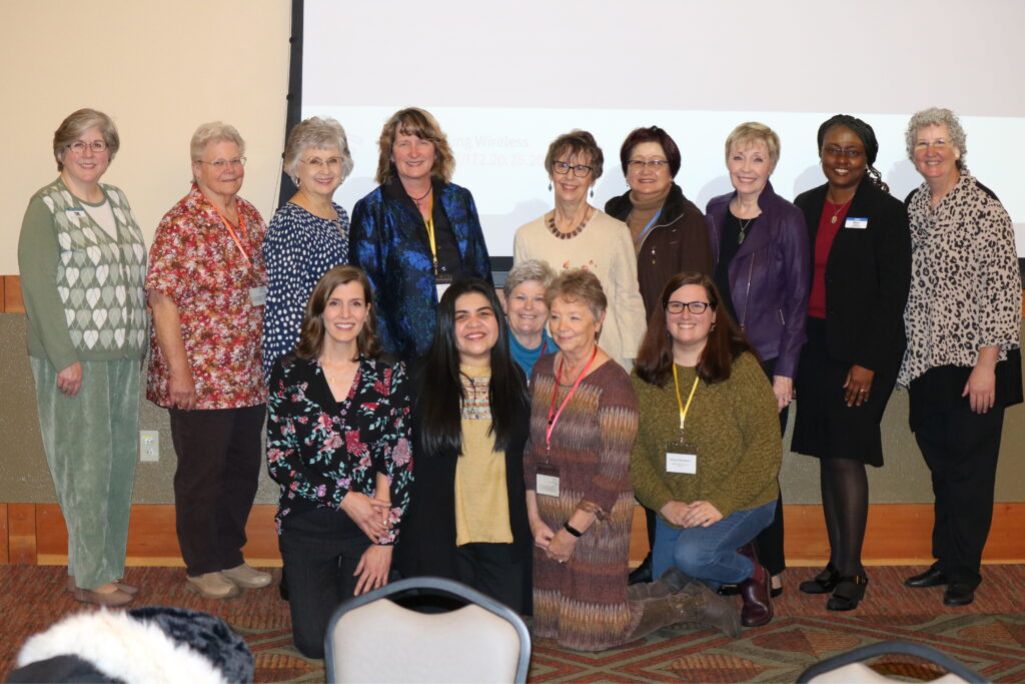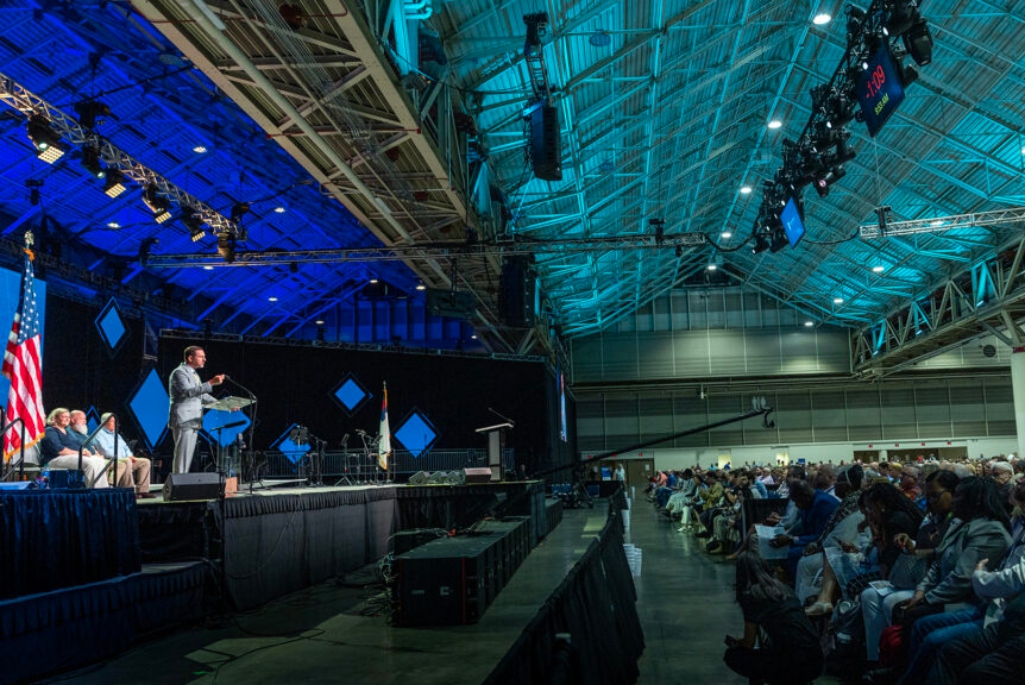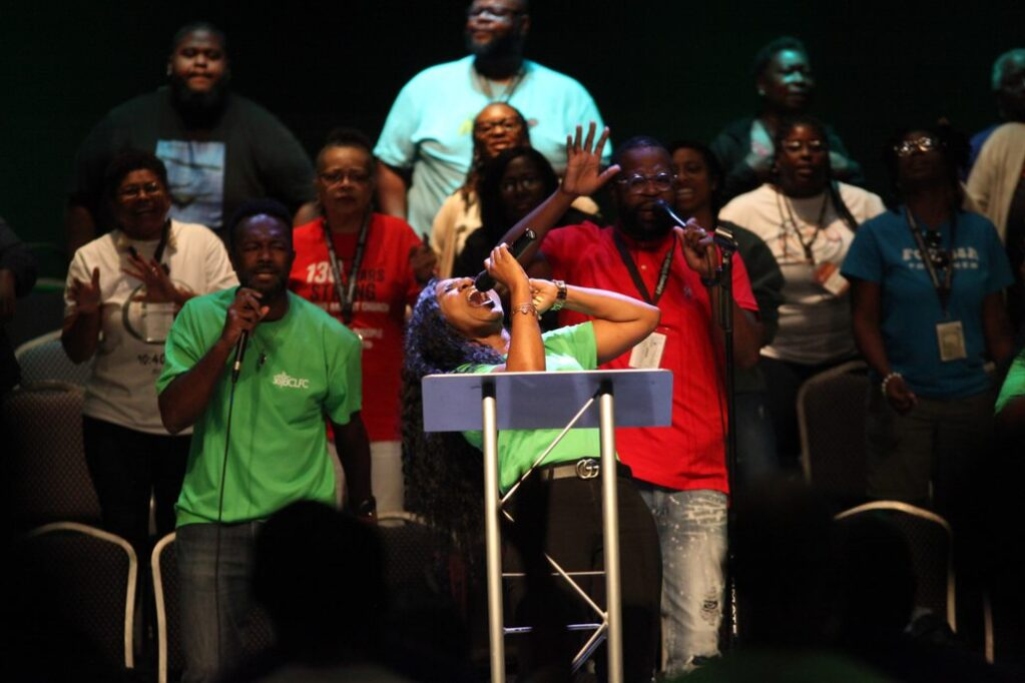
Mary Habila, second from right in the back row, stands between national WMU Executive Director-Treasurer Sandy Wisdom Martin, far right, and Nancy Hall, who leads Northwest Women for the Northwest Baptist Convention (NWBC), after a missions celebration at the 2023 NWBC annual meeting.
FEDERAL WAY, Wash. (BP) — For Mary Habila, it’s about understanding a person — getting through what is happening at the surface and figuring out what is going on underneath to create a situation. Then, you take steps to make things better.
She does this as a school counselor for the district where she lives and her husband, Haggai, is pastor of Living Spring Fellowship in the Puget Sound area of Washington. It is a gift she also used on the board for the Northwest Baptist Convention and as state Woman’s Missionary Union (WMU) president, being the first Black woman to serve in those roles.
“I started volunteering in the school system to understand it and know how better to support the kids,” said Habila, in her fourth year as a psychologist after having volunteered in the system for more than seven years prior to that. “I saw there were a lot of cracks in the wall and struggles for Black and Brown kids that God put on my heart.”
Habila was a computer analyst in her native Nigeria when Haggai left for the U.S. for theological education at Southern Baptist Theological Seminary (SBTS). He had been on administrative staff for a ministry that worked with inmates upon their release.
“He did that for more than 14 years,” his wife said. “We realized he needed more training.”
She and their three children joined him two years later, in September 2004. They moved to Washington state in June 2011 to plant Living Spring Fellowship. Northwest Baptist Convention Executive Director Randy Adams knew after meeting the couple the value they brought to the state convention
“Mary and Haggai are both great people,” he said. “I first knew them as church planters. They struck me as deeply spiritual and committed to loving people and sharing Christ with each person.
“But it was hearing Mary pray that most struck me. I asked her to open our annual meeting by leading us in prayer several years ago, and her prayer was a highlight of the meeting. Truly it was. To hear Mary pray is to be brought to the throne of God. That’s why we wanted her on our executive board.”
Adams asked Habila to serve on the state’s executive board. Her missions experience both in Nigeria and the Northwest led to her being asked to lead the convention’s church planting committee.
“It was a privilege and opportunity to learn from wise people and contribute to the work here,” Habila said. “I was also able to share through the lens of an immigrant but also someone on the church planting field, and I think that was beneficial.”
One of those areas to which she gave more light was the importance of ministering to church planters’ wives and children. She was happy to provide perspectives different from what men may have.
“You want the full family carried along in a healthy way,” she said.
Habila recently completed a tenure as state WMU president that began in 2019, getting an extra year due to COVID-19. Her initial response when asked was that she wasn’t the right one for the role. But that humility actually made her the perfect candidate.
“I said I couldn’t do it and felt the Lord immediately say, ‘Yes, you cannot. But can you trust Me to do it through you?’” she said.
COVID shut down in-person meetings for basically two years.
“The Lord used that time to start something new,” Habila said.
Everyone was struggling, she said, in numerous ways. And as Adams would testify, Habila went with one of her strengths.
“We had our challenges and needed to seek the face of God, so we called for a time of prayer,” Habila said.
She called for a day of prayer and fasting. All the state WMU presidents began gathering on Zoom to pray. It continues weekly, she said, and has come to include other WMU leadership and basically anyone who wants to join. When a state president rolls off, as Habila did, the new one takes her place.
Her time as WMU president coincided with increased participation from multiethnic churches in the state convention. She encouraged them to attend the annual Women’s Summit held in April. During her time, attendance at the event doubled from roughly 200 to 400.
“When I stepped into the leadership role for WMU, I prayed for the convention to become more diverse,” she said. “When I shared at the annual meeting, it was a joy to see the diversity in the room. There were so many from different tribes and nations.”
Her time of service was mutually beneficial.
“The roles both on the executive board and with WMU helped my faith grow,” said Habila. “Serving with more experienced people — other women and the executive board — helped me grow for greater responsibilities that the Lord may put before me in the future.”
(EDITOR’S NOTE — Scott Barkley is chief national correspondent for Baptist Press.)


